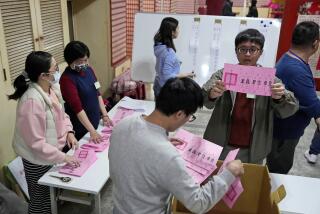Taiwan’s Ruling Party Wins Local Vote, Cements Position : Asia: President Lee puts his prestige on the line and Nationalists get 15 of 23 posts in mayoral and county magistrate races.
- Share via
TAIPEI, Taiwan — President Lee Teng-hui, who put his prestige on the line by actively campaigning for candidates in local elections, warded off challenges from two rival political parties Saturday to consolidate the dominant position of his ruling Nationalist Party.
Of the 21 city mayoral and county magistrate positions on the island at stake Saturday, the Nationalist Party won 13, compared to six for its principal rival, the Democratic Progressive Party, and none for the recently formed New Party, composed of breakaway members of the Nationalist Party. Independents won two posts. The Nationalists also won uncontested races on the islands of Chinmen (Quemoy) and Matsu in the Taiwan Strait off the coast of China. The results were little changed from the previous election.
Some political analysts here speculated before the vote that a strong showing by the Nationalist Party (Kuomintang) might prompt Lee to advance the date of Taiwan’s first presidential election by popular vote, currently set for 1996. The presidential election is the last major remaining step in Taiwan’s rapid adoption of a democratic system that began with the lifting of martial law in 1987.
The elections had been widely portrayed as the most important measure yet of the loosening Nationalist grip on power in Taiwan. A poll taken weeks before the elections by the Gallup Organization Taiwan Inc. showed that public support for the Kuomintang, the party of the late national heroes Dr. Sun Yat-sen and Chiang Kai-shek, had fallen to a historic low of only 25%.
But in an aggressive attempt to bolster his party’s showing, Lee went to the streets to campaign alongside mayoral and county candidates. A Cornell University Ph.D., Taiwan-born Lee lighted incense sticks and posed with babies in the folksy style of a local pol.
The Nationalist Party won 47% of the vote, compared to 41% for the Democratic Progressive Party, formed in 1986 as a pro-Taiwan-independence party opposed to the government policy of eventual reunification with mainland China.
It was the first time that the ruling party had fallen below 50% of the popular vote, a fact partly attributable to the 3% showing by the New Party, composed of mostly mainland Chinese descendants who emphasize the traditional Kuomintang position of mainland-Taiwan reunification.
Independents garnered about 8% of the vote, winning seats in Miaoli County and the central Taiwan city of Chaiyi.
The local elections were watched attentively in China, where Communist leaders looked warily upon the upstart Democratic Progressive Party and its early demands for Taiwan independence. The Communists and the Nationalists have been bitter rivals since the mainland civil war that ended in 1949 with Chiang Kai-shek and his supporters fleeing to Taiwan, but the emergence of the Democratic Progressives forced them into an odd political alliance.
Since the Communists and the Kuomintang both officially support the idea of a reunified China, albeit with different opinions about who should run it, the Democratic Progressives’ talk of Taiwan independence was anathema to both.
Despite Lee’s active intervention in his home district of Taipei County, the island’s biggest election district with a population of more than 3 million in the capital area, the incumbent Democratic Progressive candidate, You Ching, won easily.
To boost his campaign, You promised elderly residents of the county a monthly allowance of $180. The Nationalist candidate, Tsai Sheng-pang, was hurt by the candidacy of breakaway former Nationalist legislator Li Sheng-feng, campaigning as a member of the New Party. By getting 210,00 votes, compared to 475,000 for Tsai and 613,000 for You, Li showed the potential of the New Party as a spoiler in future elections.
“The KMT (Nationalists) are killing themselves,” said Taipei County bus driver Lai Shen-tsai, 46. “You Ching promised if elected he would give money to old people and make high schools and junior high schools free. That’s why the working class is more likely to vote for him.”
But the Taipei County vote was one of only a few bright spots for the Democratic Progressive Party. Going into the election, the opposition party had been hoping to increase its mayoral and county positions from seven to 10 or more. Instead, its number fell to six.
Disappointed Democratic Progressive Party Chairman Hsu Hsin-liang made good his promise to resign if the party failed to win 11 seats.
Political observers called the election one of the cleanest in memory.
More to Read
Sign up for Essential California
The most important California stories and recommendations in your inbox every morning.
You may occasionally receive promotional content from the Los Angeles Times.













